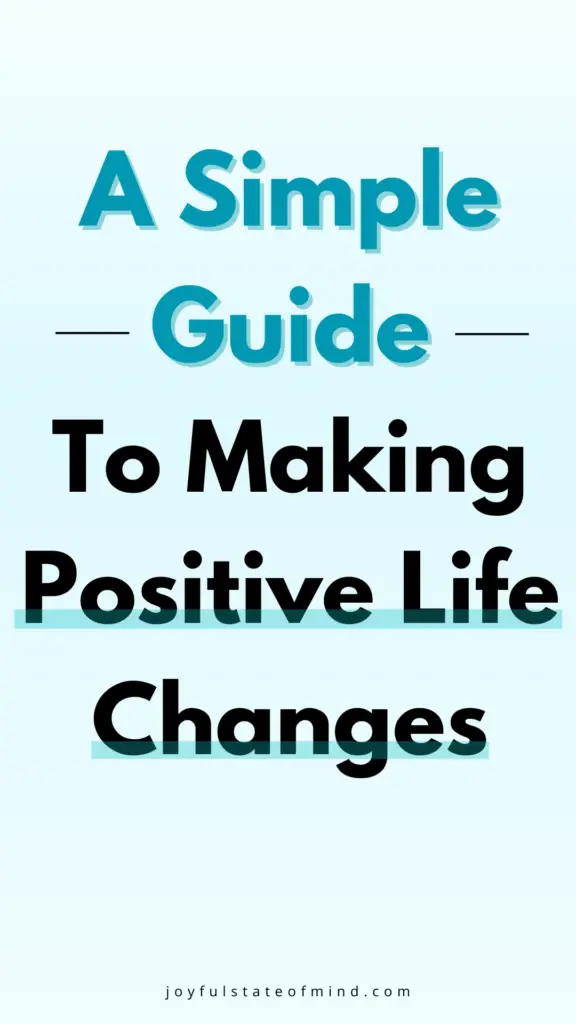5 Easy Steps to Making Positive Life Changes

It takes courage to change and improve your life, so today, I wanted to share 5 easy yet powerful steps to making positive life changes.
In the past few years, my life has significantly changed. Mostly for the better. Though at times, the changes felt like the absolute worst.
Just before my father passed away and after that, there was a period of darkness in my life. That’s when it became clear that things needed to change. I needed to take steps to make positive life changes, some of which were long overdue.
I think the word change sometimes conjures up grandiose images of us moving mountains, leaving little recognizable. But change isn’t usually that obvious or dramatic, and more often, it’s a progression.
Of course, there are exceptions and things that will change your life in the blink of an eye, but I’m not talking about those types of changes. I’m referring to the changes that you want to make to improve something, simplify, or even start fresh in an area.
These types of changes can start with small steps. It can be something as simple as reading more often or exercising a few times a week. Maybe it’s something on a larger scale, such as quitting your job, starting your own business, or going back to school.
My Experience With Making Positive Life Changes
As insignificant as it may sound, the small step I first took was sending a text message. It wasn’t dramatic; it was a polite message and would seem ordinary to anyone who read it, but I knew it would be a problem. Not because of anything I wrote, but because of this person’s irrational thinking.
That was the beginning of a strange season. At times, I questioned if I should’ve just kept ‘going with the flow’ and tried to maintain a false sense of peace in a dysfunctional unit. Maybe that would have been better.
Well, many years later, and there’s no doubt everything happened for a reason. I’m glad I followed my heart as it brought about positive improvements for myself and others.

5 Easy Steps to Making Positive Life Changes
These steps are a guide to kickstart your journey. There’s no pressure to tackle all these steps at once; instead, view them as a roadmap for positive changes. Effort and commitment are essential to the process of making change, but the rewards are worth it.
1. Identify What Needs to Change and Understand Why.
I knew I needed to identify what needed to change, and that was removing toxic things in my life. I understood why that change was vital because I clearly defined my core values, how I wanted to live, and what I wanted to focus on.
Clearly defining your values and intentionally living by them is essential to making positive changes and living a meaningful life. When goals align with your core values, you’re more likely to follow through with them and gain more satisfaction. (1)
If you waver on your values, you’re likely to compromise them to appease others and maintain relationships or circumstances that aren’t enriching your life in the first place. Ultimately, this will cause you pain and unnecessary stress.
This first step is essential, so take time to think about and determine your core values. Not only for making changes but for living more authentically.
Below are the core values I outlined that now guide the choices I make:
- Deepening my spiritual growth and faith.
- Living a peaceful life and sharing that peace with others (actively pursuing this, i.e., surrounding myself with great people and distancing from negative people).
- Nurturing positive relationships in my life.
- Ongoing personal growth. (Learning, working on goals, pursuing dreams, challenging myself, and getting out of my comfort zone.)
- Being of service to others through volunteering, donating, or just being a good listener and friend to someone in need.
2. Write it Down and Share it for Accountability.
Research by Dr. Gail Matthews at Dominican University shows that people who write down their goals achieve significantly more success than those who don’t. (2) It’s a simple yet powerful strategy.
How awesome is that?
The act of thinking about your goals and then putting pen to paper is also therapeutic. Find what works for you, whether it’s a brief sentence or two or bullet points.
Two more effective ways to stay on track, backed by the same study, are having an accountability partner and publicly committing to your goals. (3)
Discussing progress weekly with a friend or family member helps you achieve more, and taking it a step further by publicly committing to your goals, such as sending an email or written note, greatly increases your chances of success.
💡Here’s an easy way to remember these accountability methods:
Write, Share, Commit & Partner!
3. Set Realistic Goals to Guide Your Journey to Positive Changes.
Imagine the satisfaction of losing weight, landing that dream job, or freeing yourself from a draining relationship. The path to success begins with well-defined goals that light your way.
Create SMART goals, an acronym that stands for:
- Specific
- Measurable
- Achievable
- Relevant
- Time-bound
Setting clear, detailed goals will influence how motivated you are and increase the likelihood of successful outcomes.🌟
For instance, instead of aiming to “lose weight,” set a goal to go on morning runs/walks at 7 a.m. and explore new, clean vegan recipes. Try breaking it down even further by asking yourself why you want this and why it’s important, and your progress becomes clearer.
If you’re working on improving a romantic relationship, establish actionable goals such as engaging in meaningful conversations weekly at 8 p.m. on Tuesdays. or scheduling small tasks to do together on a Sunday afternoon, be it a fun activity, a shared DIY project or simply chilling out together.
4. Create a Simple Action Plan.
An action plan is a detailed checklist outlining the tasks necessary to accomplish your goals. Having a simple, thought-out list is beneficial as it will help you stay on course and not feel overwhelmed.
Start with small, manageable steps. If, for instance, you’re aiming to talk to your boss about an issue(s), your initial tasks might include items like “Schedule a time to talk” or “Compile a list of discussion topics.”
After defining these tasks, schedule dedicated time for them in your phone calendar or planner. This will help you stay organized and ensure you actively work towards your goals.
If you want to delve deeper, here’s an article about writing action plans with templates and examples.
Related Article: 65 Powerful Quotes About Taking Action
5. Focus On Small Increments and Self-Compassion.
Consistently taking small steps is key to staying connected with your goals and boosting productivity. If you’re prone to forgetfulness (like me), schedule tasks in your planner or digital calendar and set alarms for reminders.
Achieving small goals triggers the release of dopamine, the “feel-good” neurotransmitter in your brain (4). This heightened motivation and focus turn the process of change into a more enjoyable journey (5).
I like to schedule 15-30 minutes per task. Breaking down tasks into manageable time increments makes it easier to follow through and minimizes procrastination rather than being overwhelmed by tackling a massive 4-hour session.
You’ll find starting small helps establish a positive rhythm, which often leads you to work longer and get more done.
Equally important is practicing self-compassion. Life is unpredictable, challenges arise, and unexpected events can disrupt your plans for days, weeks, or even longer. Instead of getting frustrated, show yourself forgiveness and understanding.
The journey of making positive change is about progress, not perfection.
Don’t forget to celebrate your achievements, big or small, along the way. Consistency is your ally. Take one step at a time, and acknowledge every milestone on your unique path to positive life changes.

Lessons Learned:
In the process of making positive changes, I learned many valuable lessons, and I wanted to share these two below.
1. Change Comes with Hardships.
When you start to create healthy boundaries, you will experience resistance from people when it comes to relationships. When you choose a path different from those around you, expect pushback.
Dealing with individuals who undermine you through passive-aggressive comments or condescending remarks like “you’re just not the same person” is unfortunately common. Some people are consumed by negativity, determined to bring others down.
Regardless of the changes you’re making, criticism and discouragement are inevitable. Rather than letting it dishearten you, use it as fuel and motivation to keep going.
Please remember it’s not your job to manage other people’s opinions or be a people-pleaser.
It’s your job to follow your heart and do what is right for you and your family, even if it means losing or unintentionally upsetting or hurting people by setting clear boundaries.
If you stay focused on making positive changes, soon those hardships will transform into triumphs.
2. Change is Necessary for Growth.
When I look back on the changes I’ve made over the past years, I can confidently say that as tricky as some of those periods have been, despite the challenges, every step was necessary to create a fulfilling life my family and I love.
From prioritizing my health and setting better boundaries to shedding toxic relationships, being more present for my daughters and husband, and deepening my faith – each change played a pivotal role in my personal growth.
It’s not always a straightforward path; anxiety and stress sometimes show up, but ultimately, positive change is essential to living a life you love.
Related Article: How To Reduce Anxiety in The Moment: 5 Simple, Powerful Tips
Positive Life Changes: Takeaway Insights
Embarking on the journey of positive life changes takes courage; be mindful not to overwhelm yourself with lofty expectations. Instead, hone in on manageable, incremental steps and celebrate every small victory along the way.
Since the road to change isn’t a leisurely walk, acknowledge and be proud of your self-awareness and your progress toward self-improvement.
The steps I’ve outlined are crafted to offer some practical insights to help support positive transformations in your life. Remember to extend the same kindness and patience to yourself that you readily extend to others. Keep moving forward!💪

References:






So helpful, thanks for sharing! I’ve recently let go of a toxic friendship and while it’s weighing heavily on my heart right now I know it’s for the best 💔
It takes courage to let go of toxic relationships, especially when there is an emotional attachment. As hard as it is, I couldn’t agree more that it’s for the best, and you’ll begin to see that soon.
Thanks for sharing, Jaclyn:)
I couldn’t agree more with all your advice! I believe personal growth and spiritual growth are one in the same. Glad you mentioned that difficulties will a part of the change. I think that is what people try to avoid which makes change hard. Journaling has been a Godsend through the changes of my life.
https://www.kathrineeldridge.com
Thanks so much Kathrine! My personal growth and spiritual growth have been very much connected. I’m grateful for this because it has given me a new outlook and a sense of peace amidst adversity.
What a great read, very inspirational! I liked how you didn’t just tell the reader how to make change but also gave examples on how to do so.
I like the part about putting ‘pen to paper’: it’s something I do an on going basis that always seems to work 👍.
Wow, thanks, Patricia I’m so glad you found this post helpful and inspiring! Writing is not only essential; it’s also therapeutic since it gives us time to process our thoughts.
I’m a go with the flow person but making change around personal growth is so hard. I love that you included examples! These suggestions are so helpful, especially how to set goals and to block off smaller chunks of time to work on them.
Jill – Doused in Pink
It is hard but there are areas that if you just keep going with the flow it will harm you or even take away from your happiness. That’s been my experience as I’ve been a ‘go with the flow’ kind of person too and in hindsight that was not the best decision in many areas. Thanks for sharing Jill and glad you found the suggestions helpful!
Martha, You have shared so many helpful tips – along with your personal journey – which adds to the validity of what you are saying. I totally agree – that writing things down is so important – and it clears the “clutter” out of our mind. I have found that once I write it down – it seems a lot less overwhelming and manageable. Looking forward to more insightful posts…
Lisa – Daily Style Finds
Thanks so much for stopping by Lisa and leaving these kind words! I couldn’t be happier that people are finding this post helpful. Yes, writing things down does help give you more clarity.
Thanks so much for sharing. These are great and practical steps. I am sorry to hear you had a darker period. I have been there and appreciate your honestly.
Amy Ann
Straight A Style
Thanks so much, Amy Ann; going through these challenging periods, is something that connects us all.